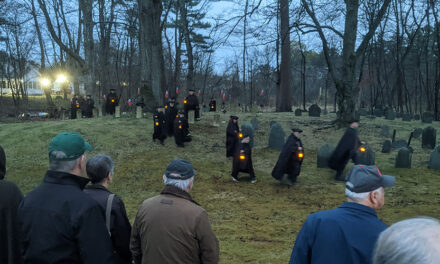By MAUREEN DOHERTY
LYNNFIELD — An emergency meeting of the Board of Selectmen was held Monday morning to finalize and post the Town Meeting warrant for Oct. 20. The warrant contains 18 articles and was posted by the end of business in order to meet the 14-day notification requirement under the town’s bylaws.
Conflicting advice received by the town from the Secretary of State’s office initially interpreted the town charter requirement for the posting of the public notice for the October Town Meeting as being just seven days, the same number of days required for the Annual Town Meeting held in April.
Based on that advice, the board announced after closing the warrant at its Sept. 29 meeting that its regularly scheduled meeting for Monday, Oct. 6 was being postponed to Thursday, Oct. 9, at which time the warrant would be finalized.
According to the Town Administrator’s office, a subsequent review of the town’s bylaw requirements was done by Town Counsel Thomas Mullen who opined that the 14-day posting requirement stipulated in that bylaw was mandatory, necessitating the emergency meeting. Notice of this meeting was posted last Thursday.
The board will still meet Thursday, Oct. 9 at 7 p.m. to conduct its other regularly scheduled business.
18 articles
When the fall Town Meeting convenes in the Lynnfield Middle School auditorium on Monday, Oct. 20 at 7:30 p.m., voters will be asked to consider 18 articles, some of which address routine financial housekeeping matters and the traditional zoning changes normally taken up each fall. Still others deal with weightier matters, such as whether to sell Centre Farm back to private ownership and three citizens’ petitions that seek to alter the Town Charter, changing the way the town governs itself.
Charter changes sought
The selectmen determine the order in which articles appear on the warrant and a trio of citizens’ petitions that seek to change the Town Charter will be among the first to be considered as Articles 5, 6 and 7.
These three articles were submitted just under the deadline the day the warrant closed Sept. 29 and have not been discussed at a public meeting other than as part of the brief overviews of each warrant article summarized by Town Administrator Bill Gustus at last week’s selectmen’s meeting.
Article 5 seeks to see if the town will vote to petition the Legislature to repeal the existing Town Administrator form of government and replace it with the Executive Assistant form of government that had been in place prior to 1993.
Coincidentally, the selectmen are in the midst of a search for a new Town Administrator as Gustus announced his intention to retire at the end of this year. MMA, the search firm hired by the board to conduct the search, reported to the board that over 30 applicants responded to the advertisement, which closed last week. The firm is now vetting those those candidates to narrow the field of candidates for the selectmen to interview.
Article 6 seeks to establish a residency requirement for nine department heads (T.A., town clerk, treasurer, tax collector, building inspector, fire chief, superintendent of schools, police chief and DPW director). It would exempt current employees and require the residency to occur within one month of date of hire.
Article 7 seeks to reinstate the Consolidated Personnel Board as it existed in 1983. The bylaw is 14 pages long and establishes a five-member Personnel Board appointed by the selectmen who would serve without pay. The bylaw defines everything the Personnel Board would oversee, from job descriptions and compensation packages to grievance procedures, and requires the board to serve “in an advisory capacity to the town in all matters relating to all salary, rate or classification changes for any employee position, except those under the jurisdiction of the School Committee.”
Article 8 concerns a fourth citizens’ petition at the request of the residents who reside in the vicinity of Sparhawk Drive who seek to close the public way at the road’s intersection with Walnut Street. The residents consider it an issue of public safety due to “constant cut-thru traffic and u-turns.”
Sale of Centre Farm
Article 9 would authorize the Board of Selectmen to seek sealed bids for the sale of the seven-acre Centre Farm and all its buildings and fixtures at 567 Main St. on “terms and conditions as the Selectmen deem prudent.”
Results of the Requests for Proposals (RFP) posted by the town last month will be known by Oct. 17, three days prior to Town Meeting. The minimum bid price has been set at $1.4M, the price the town paid for the property at closing on Oct. 3. Additionally, the sale would be subject to an agreement between the town and any buyer to adhere to the preservation restrictions the town added to the deed that prohibit further subdividing of the property and require that the exterior of the building and any new construction on the premises remain true to its colonial-era architecture.
Article 10 seeks funds through transfer or appropriation to repair pre-existing drainage pipes servicing the high school that were discovered during the construction of the new turf fields to be in disrepair and quite old.
Article 11 requests that the selectmen submit an application to the state Division of Conservation Services for a Parkland Acquisition Renovations for Communities (PARC) grant to redevelop Jordan Park. If approved, the town could be eligible for up to a 56 percent reimbursement of the $740,800 cost of upgrades to Jordan Park.
Article 12 seeks to close a potential loophole under the town’s zoning bylaws affecting its Planned Village Development District (PVDD) by adding to the list of expressly prohibited uses both adult uses and medical marijuana facilities.
Article 13 seeks to further tighten the interpretation of Special Permits for Adult Uses as defined in Section 8 of the town’s zoning bylaws. The Planning Board recommends amending Section 8.5.3.2 Location by adding the sentence: “An adult use may only be located within the Commercial District within the town.”
Article 14 is also sponsored by the Planning Board, which seeks to revamp the Wireless Communications bylaw. Approval of this article would delete Section 9.4 of the Wireless Communication District and replace it with a new section known as “8. Special Permits, 8.7 Siting of Radio Telecommunications Facilities.” This article would also add a new section under “7.4a Additional Requirements for Personal Wireless Service Facilities (PWSF).” The article itself encompasses 16 pages of regulations.
Article 15 seeks to accept Pizzuti Way as a public way.
Article 16 seeks amendments to the town’s bylaw on solicitors and canvassers under Chapter 5, Section 23 by adding four new sections. These changes would define persons who are exempt, set requirements for registering vehicles used by solicitors within the town, prohibit such activity on any residential property which has displayed a sign prohibiting trespassing, solicitation or canvassing, and set parameters and fees for renewing canvassing licenses with the Chief of Police.
Article 17 seeks to amend the town’s general bylaws on dog licenses and fees by deleting the existing section 17A and replacing it with a new section that aligns it with MGL Ch. 140 section 137.
Article 18 is a request by the Tree Committee to adopt a Scenic Road bylaw as allowed under MGL Ch. 40, section 15C. Specific roads to be included in the bylaw would be determined at a later date after a public hearing process.




